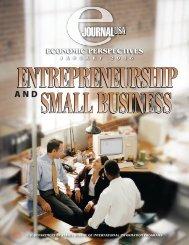s. history us history us history - Embassy of the United States
s. history us history us history - Embassy of the United States
s. history us history us history - Embassy of the United States
- No tags were found...
Create successful ePaper yourself
Turn your PDF publications into a flip-book with our unique Google optimized e-Paper software.
CHAPTER 3: THE ROAD TO INDEPENDENCESouth Carolina, to confront Britishforces led by General Charles Cornwallis.But Gates’s makeshift armypanicked and ran when confrontedby <strong>the</strong> British regulars. Cornwallis’stroops met <strong>the</strong> Americans severalmore times, but <strong>the</strong> most significantbattle took place at Cowpens,South Carolina, in early 1781, where<strong>the</strong> Americans soundly defeated <strong>the</strong>British. After an exha<strong>us</strong>ting butunproductive chase through NorthCarolina, Cornwallis set his sightson Virginia.VICTORY ANDINDEPENDENCEIn July 1780 France’s King LouisXVI had sent to America an expeditionaryforce <strong>of</strong> 6,000 men under<strong>the</strong> Comte Jean de Rochambeau.In addition, <strong>the</strong> French fleet harassedBritish shipping and blockedreinforcement and resupply <strong>of</strong> Britishforces in Virginia. French andAmerican armies and navies, totaling18,000 men, parried with Cornwallisall through <strong>the</strong> summer andinto <strong>the</strong> fall. Finally, on October 19,1781, after being trapped at Yorktownnear <strong>the</strong> mouth <strong>of</strong> ChesapeakeBay, Cornwallis surrendered hisarmy <strong>of</strong> 8,000 British soldiers.Although Cornwallis’s defeatdid not immediately end <strong>the</strong> war— which would drag on inconcl<strong>us</strong>ivelyfor almost two more years — anew British government decided topursue peace negotiations in Paris inearly 1782, with <strong>the</strong> American siderepresented by Benjamin Franklin,John Adams, and John Jay. On April15, 1783, Congress approved <strong>the</strong> finaltreaty. Signed on September 3,<strong>the</strong> Treaty <strong>of</strong> Paris acknowledged<strong>the</strong> independence, freedom, andsovereignty <strong>of</strong> <strong>the</strong> 13 former colonies,now states. The new <strong>United</strong><strong>States</strong> stretched west to <strong>the</strong> MississippiRiver, north to Canada, andsouth to Florida, which was returnedto Spain. The fledgling colonies thatRichard Henry Lee had spoken <strong>of</strong>more than seven years before hadfinally become “free and independentstates.”The task <strong>of</strong> knitting toge<strong>the</strong>r anation remained. 9OUTLINE OF U.S. HISTORYTHE SIGNIFICANCE OF THE AMERICAN REVOLUTIONThe American Revolution had a significance far beyond <strong>the</strong> North Americancontinent. It attracted <strong>the</strong> attention <strong>of</strong> a political intelligentsia throughout <strong>the</strong>European continent. Idealistic notables such as Thadde<strong>us</strong> Kosci<strong>us</strong>ko, Friedrichvon Steuben, and <strong>the</strong> Marquis de Lafayette joined its ranks to affirm liberalideas <strong>the</strong>y hoped to transfer to <strong>the</strong>ir own nations. Its success streng<strong>the</strong>ned <strong>the</strong>concept <strong>of</strong> natural rights throughout <strong>the</strong> Western world and fur<strong>the</strong>red <strong>the</strong> Enlightenmentrationalist critique <strong>of</strong> an old order built around hereditary monarchyand an established church. In a very real sense, it was a precursor to <strong>the</strong>French Revolution, but it lacked <strong>the</strong> French Revolution’s violence and chaosbeca<strong>us</strong>e it had occurred in a society that was already fundamentally liberal.The ideas <strong>of</strong> <strong>the</strong> Revolution have been most <strong>of</strong>ten depicted as a triumph<strong>of</strong> <strong>the</strong> social contract/natural rights <strong>the</strong>ories <strong>of</strong> John Locke. Correct so far as itgoes, this characterization passes too quickly over <strong>the</strong> continuing importance<strong>of</strong> Calvinist dissenting Protestantism, which from <strong>the</strong> Pilgrims and Puritans onhad also stood for <strong>the</strong> ideals <strong>of</strong> <strong>the</strong> social contract and <strong>the</strong> self-governing community.Lockean intellectuals and <strong>the</strong> Protestant clergy were both importantadvocates <strong>of</strong> compatible strains <strong>of</strong> liberalism that had flourished in <strong>the</strong> BritishNorth American colonies.Scholars have also argued that ano<strong>the</strong>r persuasion contributed to <strong>the</strong>Revolution: “republicanism.” Republicanism, <strong>the</strong>y assert, did not deny <strong>the</strong>existence <strong>of</strong> natural rights but subordinated <strong>the</strong>m to <strong>the</strong> belief that <strong>the</strong> maintenance<strong>of</strong> a free republic required a strong sense <strong>of</strong> communal responsibilityand <strong>the</strong> cultivation <strong>of</strong> self-denying virtue among its leaders. The assertion <strong>of</strong>individual rights, even <strong>the</strong> pursuit <strong>of</strong> individual happiness, seemed egoistic bycontrast. For a time republicanism threatened to displace natural rights as <strong>the</strong>major <strong>the</strong>me <strong>of</strong> <strong>the</strong> Revolution. Most historians today, however, concede that<strong>the</strong> distinction was much overdrawn. Most individuals who thought about suchthings in <strong>the</strong> 18th century envisioned <strong>the</strong> two ideas more as different sides <strong>of</strong><strong>the</strong> same intellectual coin.Revolution <strong>us</strong>ually entails social upheaval and violence on a wide scale.By <strong>the</strong>se criteria, <strong>the</strong> American Revolution was relatively mild. About 100,000Loyalists left <strong>the</strong> new <strong>United</strong> <strong>States</strong>. Some tho<strong>us</strong>ands were members <strong>of</strong> oldelites who had suffered expropriation <strong>of</strong> <strong>the</strong>ir property and been expelled;o<strong>the</strong>rs were simply common people faithful to <strong>the</strong>ir King. The majority <strong>of</strong>those who went into exile did so voluntarily. The Revolution did open up andfur<strong>the</strong>r liberalize an already liberal society. In New York and <strong>the</strong> Carolinas,large Loyalist estates were divided among small farmers. Liberal assumptionsbecame <strong>the</strong> <strong>of</strong>ficial norm <strong>of</strong> American political culture — whe<strong>the</strong>r in <strong>the</strong> disestablishment<strong>of</strong> <strong>the</strong> Anglican Church, <strong>the</strong> principle <strong>of</strong> elected national andstate executives, or <strong>the</strong> wide dissemination <strong>of</strong> <strong>the</strong> idea <strong>of</strong> individual freedom.Yet <strong>the</strong> structure <strong>of</strong> society changed little. Revolution or not, most people remainedsecure in <strong>the</strong>ir life, liberty, and property.6465












